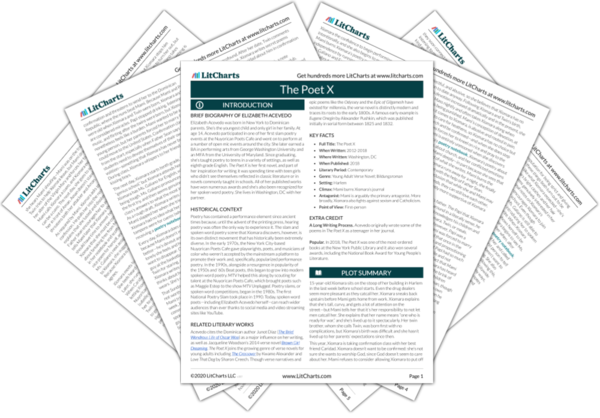Sexuality and Shame
The Poet X follows 15-year-old Xiomara, a second-generation Dominican American living in Harlem. In part because of Xiomara’s upbringing in the Catholic Church and in part because of her family’s Dominican traditions, Xiomara’s sexual coming of age is something that she, as a curious and questioning teen, can’t ignore—but it’s something that disturbs her mother, Mami, and that Mami tries her hardest to squash. As Xiomara begins a romantic relationship with her lab…
read analysis of Sexuality and ShameReligion and Coming of Age
Xiomara’s family is extremely religious, and she grew up spending much of her free time at her local Catholic church. As Xiomara grows and begins to come of age, however, religion starts to look far less meaningful and fun. Instead, Xiomara recognizes that the ideas that Father Sean preaches about are meant to keep her, as a young woman, in line—and in many cases, discourage her from ever voicing the doubts that she has…
read analysis of Religion and Coming of AgeThe Power of Language
Because The Poet X is set up to read as Xiomara’s private poetry notebook, language and its power rise to the forefront almost immediately. Xiomara notes early on that her notebook is the only place where she can write as her true self and actually express all of the confusing thoughts and emotions swirling around inside of her. As the novel progresses, Xiomara gains confidence as she begins to share her poems, first…
read analysis of The Power of Language
Family, Abuse, and Expectations
Xiomara’s home life is wildly dysfunctional and, at times, extremely abusive—if Xiomara in particular doesn’t follow Mami’s rules to the letter, Mami hits her. Papi is around but, according to Xiomara, barely has a presence in their home. Meanwhile, both Xiomara and Twin feel compelled to hide their unhappiness in their repressive household. All of this stems from familial and cultural expectations that, for at least two generations, have made life difficult for…
read analysis of Family, Abuse, and Expectations






